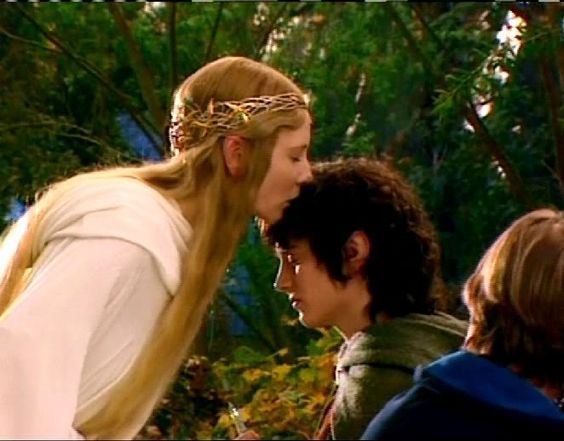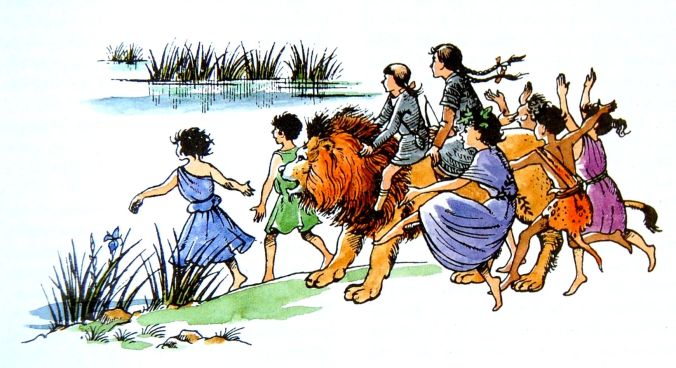The Two Towers by J.R.R Tolkien (Harper Collins 1991, 2007) pp. 882-884
While on the journey to Henneth Annûn, Faramir had spoken to Frodo and Sam about his love for the memory, the ancientry, the beauty and the present wisdom of the city of the Men of Númenor, Minas Tirith, and his desire, therefore, to defend that city against Sauron, the Lord of Darkness. Faramir lives in a big world and before he sits to eat with his guests and his men he leads them all in a simple ceremony in which all stand and face west “in a moment of silence”.

Faramir remembers “Númenor that was” as was brilliantly re-imagined for “The Rings of Power”. This visual re-imagination was probably the best thing of that series.
This is the only ceremony that takes place throughout the entirety of The Lord of the Rings until the crowning of the High King of Gondor and of Arnor. There might be an argument to be made that the peoples of Middle-earth are ritually malnourished, an argument that could be made about the West in our own time, but Tolkien had good reason not to give his secondary creation a ritual structure. His creation was a mythical history of our own world but in a world before the incarnation of Christ, the True Myth as he famously explained to C.S Lewis, the moment in which myth and history became one in first century Palestine.

Faramir remembers “Elvenhome that is” as depicted by Alan Lee.
His anxiety was that any attempt to create a ritual life for his sub-creation would at best be inadequate and at worst idolatrous. There is only one place of worship built in the whole of Tolkien’s legendarium and that was built by Ar-Pharazôn, the last king of Númenor, for the worship of Morgoth because Ar-Pharazôn had been seduced by Sauron who had convinced him that Morgoth was the ultimate power of the universe. So the only place of worship was idolatrous and rejected by Elendil, the Elf-friend, and his followers, of whom Faramir was a descendant.
So when Faramir leads his men in a moment of ritual before they sit to eat it is done in silence so that there can be no danger of idolatry, the worship of that which is false. But this does not mean that there is no content to the ceremony and when Faramir explains it to Frodo he shows him the world in which he lives.
“We look towards Númenor that was, and beyond to Elvenhome that is, and to that which is beyond Elvenhome and will ever be.”
Númenor is the memory and the ancientry of which Faramir spoke upon the way. While the Númenor of Ar-Pharazôn was destroyed by a great wave by Eru Ilúvatar at the end of the Second Age Elendil escaped with his followers to Middle-earth and created there the kingdoms of Gondor and Arnor. Elendil honoured the ancient friendship that the Númenorians had enjoyed with the Elves, a friendship that meant that he fought alongside Gil-galad in the last great alliance between Elves and Men that overthrew Sauron taking the Ring from his hand. Faramir recognises this as he speaks of Elvenhome that is, Valinor that lies beyond the wreck of Númenor.
And he also recognises “that which is beyond Elvenhome and will ever be”. He recognises God, Eru Ilúvatar, the source of all being and life. Later when he takes Éowyn into his arms for the very first time he tells her of the wave that destroyed Númenor. In doing this he shows that he understands that Eru had intervened once directly in the affairs of Arda and also feels that something similar has just happened at the moment in which the Ring has gone to the Fire.

Faramir remembers “that which is beyond Elvenhome and will ever be “. Anna Kulisz depicts the music of the Ainur.
Frodo feels “strangely rustic and untutored” when Faramir explains all this to him. He recognises that Faramir lives in a bigger world than he does. Faramir probably lives in a bigger world than any of his men but because they honour him as their leader so too they honour his inner life and that which he believes. He is the greatest holder of the memory, the ancientry, the beauty and the present wisdom of his people. One man holds all of this, a fragile link with it all, but the world in which Faramir lives is not held by him. He is held by it as are his men and his people whether they do so consciously or not. Soon Faramir’s world will be assaulted by the darkness and tested to its very limits. It will stand, not because of its own might, but because of that which stands beneath, around and within it, and will hold it even and especially in its darkest moments.





















